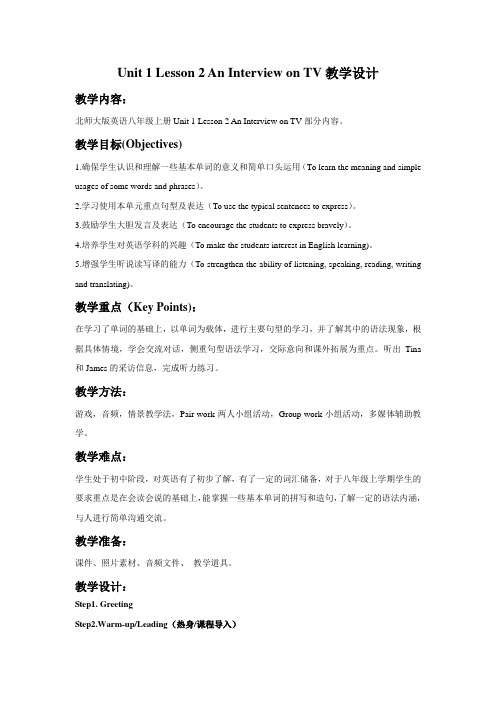北师大版-英语-八上-北师大版八上 Unit 1 英文采访稿(附中文翻译)
- 格式:doc
- 大小:29.50 KB
- 文档页数:5

Unit 1 Lesson 2 An Interview on TV教学设计教学内容:北师大版英语八年级上册Unit 1 Lesson 2 An Interview on TV部分内容。
教学目标(Objectives)1.确保学生认识和理解一些基本单词的意义和简单口头运用(To learn the meaning and simple usages of some words and phrases)。
2.学习使用本单元重点句型及表达(To use the typical sentences to express)。
3.鼓励学生大胆发言及表达(To encourage the students to express bravely)。
4.培养学生对英语学科的兴趣(To make the students interest in English learning)。
5.增强学生听说读写译的能力(To strengthen the ability of listening, speaking, reading, writing and translating)。
教学重点(Key Points):在学习了单词的基础上,以单词为载体,进行主要句型的学习,并了解其中的语法现象,根据具体情境,学会交流对话,侧重句型语法学习,交际意向和课外拓展为重点。
听出Tina 和James的采访信息,完成听力练习。
教学方法:游戏,音频,情景教学法,Pair-work两人小组活动,Group-work小组活动,多媒体辅助教学。
教学难点:学生处于初中阶段,对英语有了初步了解,有了一定的词汇储备,对于八年级上学期学生的要求重点是在会读会说的基础上,能掌握一些基本单词的拼写和造句,了解一定的语法内涵,与人进行简单沟通交流。
教学准备:课件、照片素材、音频文件、教学道具。
教学设计:Step1. GreetingStep2.Warm-up/Leading(热身/课程导入)Warm-up QuestionLook at the key words. Choose the correct words to complete the sentence in the exrcise 1.Key words:characters conversation grammar listening passage pronunciation reading speaking vocabulary writingStep3.Presentation(呈现新课)1.Words Learning!1)老师放映课件,用中文询问同学看到了什么?同学们会看到课件上呈现的有关本课单词的图画。





新课标八年级上册英语unit1SectionB2B课文翻译新课标八年级上册英语unit1 Section B 2B 课文翻译2b 部分翻译Read Janes diary entries about her vacation and answer the questions.阅读简关于她假期的日记并回答问题。
Did Jane have a good time on Monday? What about on Tuesday?星期一简过得愉快吗?星期二呢?Monday,July 15th7月15日,星期一I arrived in Penang in Malaysia this morning with my family. It was sunny and hot,so we decided to go to the beach near our hotel. My sister and I tried paragliding. I felt like I was a bird. It was so exciting! For lunch, we haci something very specialMalaysian yellow noodles. They were delicious! In the afternoon, we rode bicycles to Georgetown. There are a lot of new buildings now,but many of the old buildings are still there. In Weld Quay,a really old place in Georgetown,we saw the houses of the Chinese traders from 100 years ago. I wonder what life was like here in the past. I really enjoyed walking around the town.今天早晨我和家人到达了马来西亚的槟城。
北师大版-英语-八上-Unit1FreeTime语法及短语解析Unit 1 Free Time 语法及短语解析现在进行时,现在进行时表示将来的用法, 一般过去时,表示频率的副词,like+名词/动名词的用法,打电话的习惯用语,兴趣爱好语法:一、现在进行时1. 现在进行时的基本用法:a. 表示现在(指说话人说话时)正在发生的事情。
例如:We are waiting for you. 我们正在等你。
b. 习惯进行:表示长期的或重复性的动作,说话时动作未必正在进行。
例如:Mr. Green is writing another novel. 他在写另一部小说。
(说话时并未在写,只处于写作的状态。
)c. 表示渐变,这样的动词有:get, grow, become, turn, run, go, begin等。
例如:The leaves are turning red. 叶子在变红。
It's getting warmer and warmer. 天越来越热了。
d. 与always, forever 等词连用,表示反复发生的动作或持续存在的状态,往往带有说话人的主观色彩。
例如:You are always changing your mind. 你老是改变主意。
2. 现在进行时表示将来的用法下列动词come, go, arrive, leave, start, begin, return等表示位置移动的动词现在进行时可以表示将来。
例如:I'm leaving tomorrow. 明天我要走了。
Are you staying here till next week? 你会在这儿呆到下周吗?二、一般过去时1. 通常表示过去发生的而现在已经结束的事件、动作或情况。
Eg. Sam phoned a moment ago.I got up at eight this morning.2. 还可以表示刚刚发生的事情而没说明时间。
STUDENT NUMBER: A12120272NAME: ShileiCLASS: English 1202Inorder to find out what the life it was in the past in China, I intervewed a grangpa in our shool’s little park, who is at about his 60s.Q(Question): Hello, nice to meet you. Thank you for accepting my interview.A(Answer): Nice to meet you too.Q: Em, you look like about at 60s, right? Would you like to tell me when people mostly used bikes?A:Yeah, I was born in 1953 and I’m 61years old now. Actually, you know China was been named of “The Kingdom of Bicycle” in the past. I remember my grandpa told me that bicycle was introduced in China in the late 19th century. Then in 1960s, 1970s, when I was a young man, bicycle along with sewing machine and watch became the necessary three-major-items of marriage. Bicycle became really popular in the 1980s, it was the most important and most universal vehicle at that moment, the famous brands included “Yong jiu”, “Fenghuang”, “Feige”. The flow of thousands of bicycles during the rush hour was extremly awesome which made China became “The Kingdom of Bicycle”. You might cannot realize that kind of feeling, but you have to know who had a bicycle at that time woule bejealous by others, especially our young guys.Q: But a bicycle must be very expensive at that time, right?A: Certainly! One bicycle costed about 200 yuanat that time while people’s salary just a few dozen yuan. It’s very precious.Q: Em, what about bus? When buses appeared? And how the buses of today compare with the buses when you were young?A: Haerbin’s buses were developed in the 1950s. When I was young , buses in Haerbin were still not widespread, just several bus-lines were operated. What’s more, the buses’environment and situation were not very well when compared with the buses of today.Q: Well, I got it. How life was in your 20s’, 30s’, and 40s’? And every day life how it changed when you grew older?A: In my 20s’ , what I remember most was that you had to take the tickets or certificates to buy all the things you wanted and needed , and the number of those stuff was fixed by government, so you couldn’t buy a lot even you had money. Like the liquor, you had to buy it in state-run stores with certificate. If you wanted more, you might suppose to borrow the certificate from other family which was begrudge to buy the liquor , for the numeber of liquor was limited. And later, the individual business appeared and became more and more, so you could buy anything with money in stores. Since followed the policy of reform and opening, our daily lives becamemore and more colorful.Q: Do you rememberhow life changed when tall building were built?A:Em...In fact, the tall building didn’t bring much impact on our lives. At the beginning, we might feel shocked or wondering, but later we gradually accustomed to it. You can see, there are tall building everywhere nowadays.Q: What do you miss about the old days and what you do not miss? A: What I miss... May be the simplicity and kindness of those people, besides, at that time, they worked harder and braver. But I enjoy the high life quality of today, comprehensive health care system, varieties of entertainments, convenient public transit, etc. You know, the life in the old days is difficult.A: Yeah, sure it is. Alright then, thank to your narration, I know more details about the life in the old days, thank you!Q:It’s my pleasure!为了了解过去中国的生活是什么样的,我在学校的小公园里采访了一位60多岁的老爷爷。
问:您好,很高兴见到您,谢谢您能够接受我的采访。
答:认识你也很高兴。
问:你看起来大概60岁左右对吗?您能不能跟我讲一下人们用自行车最多是在什么时候呢?答:当然。
我出生于1953年,今年都61岁了。
事实上,中国在过去被称为“自行车王国”呢。
我记得我的姥爷告诉我自行车是在19世纪后期引进中国的。
在六、七十年代,那时候我还年轻,自行车和缝纫机、手表是年轻人结婚必备的“三大件”。
自行车真正流行起来是在80年代,那个时候自行车是最重要、最普遍的交通工具,出名的牌子有“永久”、“凤凰”、“飞鸽”。
那个时候上下班高峰期自行车流非常壮观,中国也因此被称为“自行车王国”。
你们现在可能体会不到那种感觉,但是在那个时候拥有一辆自行车是让人非常羡慕嫉妒的,特别是我们年轻人。
问:但是那个时候一辆自行车肯定很贵对吧?答:那是肯定的!一辆自行车要200块钱左右,而那个时候人们的工资只有十几、几十块。
所以自行车很珍贵。
问:嗯,那公交车呢,公交车什么时候出现?今天的公交车跟你们年轻时候的比起来又怎么样呢?答:哈尔滨的公交应该是在50年代发展起来吧。
我年轻的时候,公交还不是很普及,只有几条线路投入运行。
而且,公交车的环境和状况跟如今的比起来都很差。
问:嗯,那您20岁、30岁、40岁的时候生活是怎样的呢?随着您的年长,日常生活有哪些变化呢?答:我20岁的时候,印象最深刻的是你买任何东西都需要票或者证。
因为所有东西的数量是有国家按人口规定好的,所以即使你有钱你也买不了很多。
像酒,你要拿着证去供销社买。
如果你还想要的话,你就要借其他人的证去买。
因为每家酒的数量是一定的,但是有的人家舍不得买。
后来个体商户出现了而且越来越多,就可以拿钱买任何想要的东西。
自从改革开放政策的实行,我们的生活变得越来越丰富多彩。
问:您能给我讲讲当高楼大厦建起来的时候生活发生了哪些改变吗?答:嗯....事实上,高楼大厦并没有给我们的生活带来很大影响。
刚开始,我们看到可能会感叹会迷惑,但是后来慢慢就习惯了。
你看现在到处都是高楼林立。
问:那对于过去的日子有哪些是您非常怀念的,哪些是不怎么怀念的呢?答:嗯....要说怀念的话,应该是怀念过去人们的淳朴善良吧,而且那时候人们也更加勤劳勇敢。
但是我更享受现在的高品质生活,完善的医疗体系,多样的娱乐活动,便利的公共交通等等,这些都是过去不能比的。
你要知道过去的生活很艰苦。